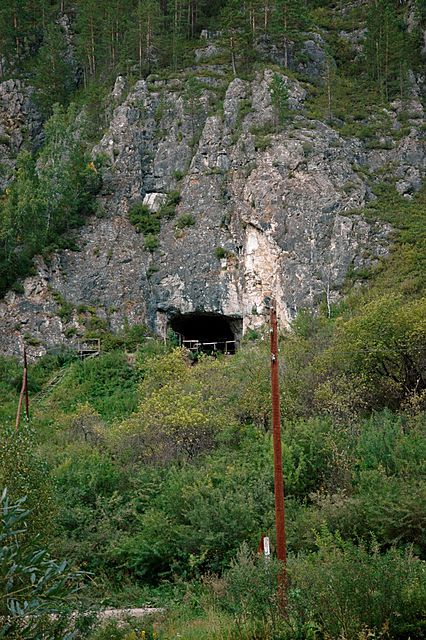
|
|
Denisova cave entrance in the Altai Mountains
of Siberia, Russia where the bones were found from which
DNA was sequenced
(Copyright (C) 2010, Johannes Krause)
|
Description
The Denisova Variants track shows variant calls made using
high-coverage sequence reads from an archaic Denisovan individual
mapped to the human genome reference assembly.
The Denisova DNA was extracted from a phalanx bone excavated from
Denisova Cave in the Altai Mountains in southern Siberia.
Methods
A novel single-stranded DNA library preparation method (Meyer, 2012)
was applied to DNA previously extracted from 40mg of bone (Reich, 2010).
Using single-stranded DNA greatly increased the genomic coverage to
30X compared to an earlier 1.9X sequence (Reich, 2010).
Sequence reads were aligned to human sequence Feb. 2009 (GRCh37/hg19)
(downloaded from the
1000 Genomes Project) using the
Burrows-Wheeler Aligner.
Genotype calls for single nucleotide variants and small insertions and
deletions were made using the Unified Genotyper from the
Genome Analysis Toolkit (GATK), with an additional iteration
using a modified reference genome in order to reduce reference bias
(Note 6,
supplementary online materials of Meyer, 2012).
Variant Call Format (VCF) files were enhanced by adding information from
Ensembl Compara EPO alignments of 6 primates and of 35 Eutherian mammals,
phastCons conservation scores generated using EPO alignments,
1000 Genomes Project
integrated variant call files,
University of Washington
background selection scores,
ENCODE/Duke Uniqueness of 20mers (see the Mappability track),
segmental duplications from the Eichler lab (see the Segmental Dups track),
and
samtools mpileup summaries of mapped reads.
Comprehensive VCF files that include information for homozygous-reference
bases and uncovered bases are available. This track uses VCF files that were filtered
to retain only those locations that clearly differ from the human reference genome.
Reference genome bases without variant calls may indicate either matching Denisova sequence
or insufficient data.
Credits
Thanks to the
Max Planck Institute for Evolutionary Anthropology
for providing the variant-only VCF files used for this track.
References
Meyer M, Kircher M, Gansauge MT, Li H, Racimo F, Mallick S, Schraiber JG, Jay F, Prüfer K, de
Filippo C et al.
A high-coverage genome sequence from an archaic Denisovan individual.
Science. 2012 Oct 12;338(6104):222-6.
PMID: 22936568; PMC: PMC3617501;
supplementary online materials, Note 2
Reich D, Green RE, Kircher M, Krause J, Patterson N, Durand EY, Viola B, Briggs AW, Stenzel U,
Johnson PL et al.
Genetic history of an archaic hominin group from Denisova Cave in Siberia.
Nature. 2010 Dec 23;468(7327):1053-60.
PMID: 21179161
|
|